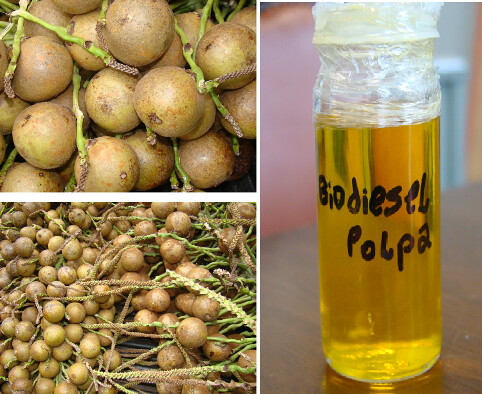Influence of the raw material on the final properties of biodiesel produced using lipase from Rhizomucor miehei grown on babassu cake as biocatalyst of esterification reactions
terça-feira, julho 30, 2019
Authors: Erika C. G. Aguieiras; Daniele S. N. de Barros; Homero Sousa; Roberto Fernandez-Lafuente; Denise M. G. Freire
 Abstract: The aim of this work was to produce esters with potential application as biodiesel via esterification with short-chain alcohols of free fatty acids (FFA) obtained from soybean and palm oils refining. Esterification reactions were catalyzed by dry lipase immobilized in fermented solids (DFS), obtained by Rhizomucor miehei grown on babassu cake by solid-state fermentation (SSF).
Abstract: The aim of this work was to produce esters with potential application as biodiesel via esterification with short-chain alcohols of free fatty acids (FFA) obtained from soybean and palm oils refining. Esterification reactions were catalyzed by dry lipase immobilized in fermented solids (DFS), obtained by Rhizomucor miehei grown on babassu cake by solid-state fermentation (SSF).
A final conversion above 80% was attained using palm fatty acid distillate (PFAD) and soybean fatty acid distillate (SFAD) as raw materials in esterification reactions with ethanol. The biocatalyst could be reused 5 times in repeated 6 h reactions after its washing with 95% (v/v) ethanol or hexane (using SFAD as raw material). Moreover, the properties of the obtained fatty acid ethyl esters (FAEE)-enriched products were characterized.
Both products were in accordance with several limits established by biodiesel-related standardized tests from Brazilian specifications including ester content (97.3% for the product obtained from SFAD), water content (180 mg Kg−1 for the product obtained from PFAD), density (867.6 kg (m3)−1for the product obtained from SFAD), viscosity kinematic (3.14–4.29 mm2 s−1), flash point (<100 °C), carbon residue (0.01 wt.%), ethanol (0.08–0.083 wt.%), free glycerol (<0.001 wt.%) and total glycerol (0.028–0.10 wt.%), monoglycerides (0.076–0.211 wt.%), diglycerides (0.0196–0.218 wt.%) and triglycerides (0.053–0.114 wt.%).
To read the full article, click here.
Page: Science Direct


















0 comentários
Agradecemos seu comentário! Volte sempre :)